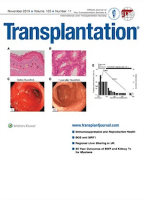
TRANSPLANTATION
Scope & Guideline
Shaping the Future of Organ Transplantation Through Science.
Introduction
Aims and Scopes
- Clinical Outcomes and Patient Management:
Research articles often focus on clinical outcomes related to various transplant types, including liver, kidney, pancreas, and heart transplants, emphasizing factors influencing patient survival and quality of life. - Immunology and Rejection Mechanisms:
The journal features studies investigating the immunological aspects of transplantation, including donor-specific antibodies, rejection mechanisms, and the role of regulatory T cells in promoting graft tolerance. - Innovations in Transplantation Techniques:
Papers often explore new surgical techniques, innovative preservation methods such as normothermic machine perfusion, and advancements in robotic-assisted transplantation. - Ethical and Societal Considerations:
The journal addresses ethical issues surrounding organ donation and transplantation, including disparities in access, the impact of socioeconomic factors, and the role of cultural beliefs in organ donation. - Emerging Therapies and Biomarkers:
Research highlights the development of novel therapeutic approaches, including the use of immunosuppressants, biomarker identification for early graft dysfunction, and the application of cell therapies in transplantation.
Trending and Emerging
- Machine Learning and AI in Transplantation:
There is an increasing interest in applying machine learning and artificial intelligence techniques to enhance predictive models for transplant outcomes and improve decision-making processes in organ allocation. - Personalized Medicine and Tailored Immunosuppression:
Research is trending towards personalized approaches in immunosuppression, with studies exploring the genetic and immunological profiles of patients to optimize treatment regimens and minimize adverse effects. - Impact of COVID-19 on Transplantation:
The ongoing effects of the COVID-19 pandemic on solid organ transplant recipients, including vaccine responses and management of infections, have emerged as a significant area of research. - Regenerative Medicine and Bioengineering:
A notable increase in studies focusing on regenerative medicine, including the use of stem cells and bioengineering techniques to enhance graft function and survival, is becoming prevalent. - Comprehensive Patient-Centered Outcomes:
There is a growing trend towards incorporating patient-reported outcomes and quality of life assessments into transplantation research, reflecting a more holistic approach to patient care.
Declining or Waning
- Traditional Organ Preservation Methods:
There is a noticeable decline in research focused solely on traditional organ preservation methods, as newer techniques such as normothermic machine perfusion gain traction and dominate discussions. - Long-term Studies on Older Transplant Recipients:
While long-term outcomes remain critical, the frequency of publications specifically addressing older transplant recipients appears to be decreasing, possibly due to a shift toward more immediate post-transplant outcomes and acute complications. - Solely Ethnic and Racial Disparity Studies:
The focus on ethnic and racial disparities in transplantation has shifted towards more integrated approaches that consider broader social determinants of health, leading to fewer studies concentrating exclusively on these aspects.
Similar Journals

Revista de Nefrologia Dialisis y Trasplante
Fostering knowledge and collaboration in kidney health.Revista de Nefrologia Dialisis y Trasplante (ISSN: 0326-3428; E-ISSN: 2346-8548) is a prominent open-access journal published by the ASOC REGIONAL DIALISIS TRASPLANTES RENALES since 2013, located in Buenos Aires, Argentina. This journal serves as a vital platform for the dissemination of pivotal research findings in the fields of nephrology and transplantation, covering a wide range of topics including clinical practices, patient outcomes, and innovative therapies. Although currently ranked in the Q4 category in both Nephrology and Transplantation by Scopus, the journal aims to elevate the discourse within these scientific communities by providing accessible and high-quality research to professionals and researchers alike. With its commitment to advancing knowledge and fostering collaboration among scientists, practitioners, and students, the Revista de Nefrologia Dialisis y Trasplante plays an essential role in addressing the critical challenges and developments in kidney health and organ transplantation.
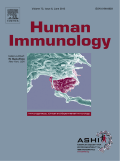
HUMAN IMMUNOLOGY
Navigating the Landscape of Immunological ScienceHUMAN IMMUNOLOGY, published by Elsevier Science Inc, serves as a critical platform for disseminating research in the fields of immunology and allergy, as well as various aspects of miscellaneous medicine since its inception in 1980. With an ISSN of 0198-8859 and E-ISSN 1879-1166, this journal is pivotal for researchers and practitioners looking to advance their understanding of human immune responses and related conditions. The journal currently holds a respectable position within its field, as highlighted by its 2023 Scopus ranks—#114/233 in Immunology and Allergy and #132/236 in Immunology and Microbiology. Moreover, it maintains a Q2 quartile ranking in both Immunology and Allergy and miscellaneous Medicine, underscoring its influence and reach within the scientific community. Although it does not currently offer Open Access options, HUMAN IMMUNOLOGY remains dedicated to providing valuable insights and fostering academic discourse within its discipline, characterized by a rigorous peer-review process and a focus on innovative research trajectories.
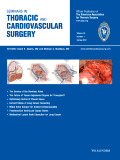
Seminars in Thoracic and Cardiovascular Surgery
Pioneering Research for Tomorrow's Surgical PracticesSeminars in Thoracic and Cardiovascular Surgery, published by Elsevier Inc, is a prestigious journal that focuses on advancing the fields of thoracic and cardiovascular surgery, cardiology, and pulmonary medicine. With a strong impact factor and an impressive reputation indicated by its 2023 rankings as Q2 in Cardiology and Cardiovascular Medicine, and Q1 in both Medicine (miscellaneous) and Surgery, the journal occupies a critical space in the academic landscape. Established in 1989, it has become a vital resource for researchers, clinicians, and students alike, fostering innovation through comprehensive reviews and cutting-edge studies. Although it does not offer open access, its robust editorial standards ensure that published articles contribute significantly to the ongoing discourse in surgical techniques and procedural advancements. Researchers and practitioners are encouraged to explore its rich compendium of peer-reviewed content that informs clinical practices and guides future investigations in the dynamic and evolving realm of thoracic and cardiovascular health.
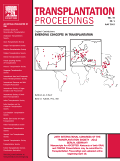
TRANSPLANTATION PROCEEDINGS
Fostering Knowledge in the Art of Transplantation.TRANSPLANTATION PROCEEDINGS is a distinguished journal published by Elsevier Science Inc, focused on the field of transplantation and surgery. With a publication history spanning over five decades, from 1969 to 2024, this journal has consistently provided a platform for researchers and practitioners to share significant findings and advancements in organ transplantation and related surgical techniques. The journal is renowned for its rigorous peer-review process and has achieved a respectable impact factor within its categories, ranking in the Q3 quartile for both Surgery and Transplantation as of 2023. With Scopus rankings placing it in the 47th percentile in Medicine (Surgery) and the 43rd percentile in Medicine (Transplantation), TRANSPLANTATION PROCEEDINGS serves as a vital resource for academics and medical professionals seeking to stay updated on the latest empirical research, clinical practices, and innovative methodologies in the field. While it does not operate under an open-access model, the journal ensures that critical insights and data are accessible to its audience, enhancing the global discourse in transplantation science. For those dedicated to advancing transplant medicine, this journal represents an invaluable collection of knowledge and a forum for fostering innovative approaches to improve patient outcomes.

Transplantation and Cellular Therapy
Illuminating Pathways in Immunology and Transplantation.Transplantation and Cellular Therapy is a leading journal published by Elsevier Science Inc, dedicated to advancing the fields of transplantation, immunology, cell biology, and molecular medicine. With its ISSN of 2666-6375 and E-ISSN 2666-6367, this journal serves as a vital resource for researchers, practitioners, and students aiming to stay at the forefront of innovative therapies and clinical practices in transplantation. As of 2023, it holds an impressive Q1 ranking in multiple categories, including Cell Biology, Hematology, Immunology and Allergy, Molecular Medicine, and Transplantation, reflecting its high impact and relevance in the scientific community. The journal, operating from its base in the Netherlands, supports Open Access publishing to enhance the dissemination and accessibility of groundbreaking research. Acknowledging the significance of transplantation and cellular therapies in modern medicine, Transplantation and Cellular Therapy is poised to propel future discoveries and developments in these critical domains.

Transplant Research and Risk Management
Enhancing healthcare through risk-aware transplant strategies.Transplant Research and Risk Management is an esteemed Open Access journal dedicated to advancing the fields of transplantation and risk analysis in healthcare. Published by DOVE MEDICAL PRESS LTD based in New Zealand, the journal has been facilitating open dissemination of research since its inception in 2010, ensuring that critical findings reach a global audience. With a focus on statistical methodologies applicable to transplant science, the journal is recognized in the Q4 category in both Transplantation and Statistics, Probability and Uncertainty fields as of 2023. Despite its current challenges in ranking, it provides an essential platform for studies that explore innovative approaches to enhance transplant outcomes and evaluate associated risks. Researchers, professionals, and students keen on the latest advancements and methodologies in this dynamic area of medicine will find valuable resources and interdisciplinary insights that propel their inquiries and practice. The journal accepts submissions that contribute to its goal of improving transplant methodologies, patient management, and broader public health strategies.

Transplantation Direct
Advancing the Frontiers of Transplantation ResearchTransplantation Direct is a leading open access journal in the field of transplantation, published by the prestigious Lippincott Williams & Wilkins. Since its inception in 2015, the journal has provided a vital platform for the dissemination of high-quality research and advancements related to organ transplantation. With an impact factor that places it in the Q2 category among transplantation journals, it ranks #22 out of 54 in the Medicine - Transplantation Scopus classification, reflecting its significance and authority within the discipline. The journal not only covers a broad scope of topics related to transplantation but also encourages global collaboration and knowledge exchange amongst researchers, clinicians, and students. With its open access model, Transplantation Direct ensures that groundbreaking findings are accessible to a wider audience, fostering innovation and enhancing patient care worldwide. For more information, visit their address at TWO COMMERCE SQ, 2001 MARKET ST, PHILADELPHIA, PA 19103.
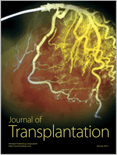
Journal of Transplantation
Exploring New Horizons in Organ TransplantationThe Journal of Transplantation is a leading peer-reviewed journal published by HINDAWI LTD, dedicated to advancing the field of organ transplantation and associated medical research. Since its inception in 2009 as an Open Access journal, it has provided a vital platform for researchers, clinicians, and students to share innovative findings and developments in transplantation science. With an emphasis on high-quality research, the journal aims to publish original articles, reviews, and case studies that contribute to the understanding of immunology, surgical techniques, and postoperative care, thereby enhancing patient outcomes. The journal is committed to fostering a collaborative scientific community and making valuable research freely accessible to professionals worldwide, ensuring that it remains at the forefront of transplantation studies. This journal serves as an essential resource for anyone looking to stay updated on the latest advancements and clinical practices in the field.
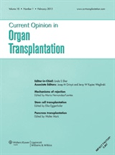
Current Opinion in Organ Transplantation
Connecting Experts in Immunology and TransplantationCurrent Opinion in Organ Transplantation, published by Lippincott Williams & Wilkins, serves as a leading journal in the fields of immunology and transplantation, providing insightful reviews and expert opinions that shape the discourse in these vital areas of medical research. With an impact factor showcasing its significance and influence in the academic community, this journal is ranked in the Q2 category for both Immunology and Transplantation according to the 2023 metrics, affirming its essential role in advancing knowledge and understanding. Spanning from its inception in 2001 through to 2024, Current Opinion in Organ Transplantation offers a platform for researchers, professionals, and students to engage with the latest advancements and trends, contributing to the ongoing dialogue that drives innovation in organ transplantation and immunological therapies. Although the journal does not currently offer open access options, its rigorous peer-review process and reputable publisher ensure the highest quality of research dissemination, making it an invaluable resource for those invested in the future of organ transplantation.
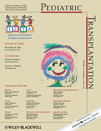
PEDIATRIC TRANSPLANTATION
Connecting research and practice to improve pediatric transplant outcomes.Pediatric Transplantation is a prestigious academic journal published by Wiley, focusing on the critical field of pediatric organ transplantation. Since its inception in 1997, the journal has played a pivotal role in disseminating groundbreaking research and clinical insights relevant to pediatric health, including both pediatrics and transplantation disciplines. With an impact factor that reflects its significance—ranking in the second quartile (Q2) within both Pediatrics, Perinatology and Child Health and Transplantation categories—it provides a vital platform for researchers and clinicians dedicated to improving outcomes for pediatric transplant patients. Pediatric Transplantation embraces a wide scope of studies, from basic science to clinical trials, promoting collaborations that enhance the well-being of young organ recipients. Published in the United Kingdom, this journal does not operate under an open access model, ensuring that the content is peer-reviewed and of the highest academic rigor. For professionals and scholars seeking to stay at the forefront of pediatric transplantation advancements, Pediatric Transplantation serves as an invaluable resource.